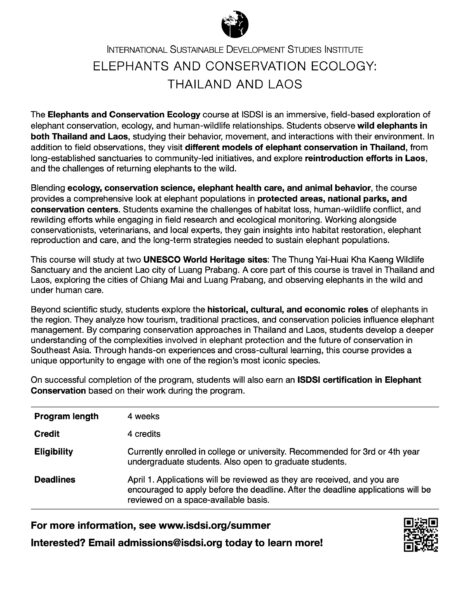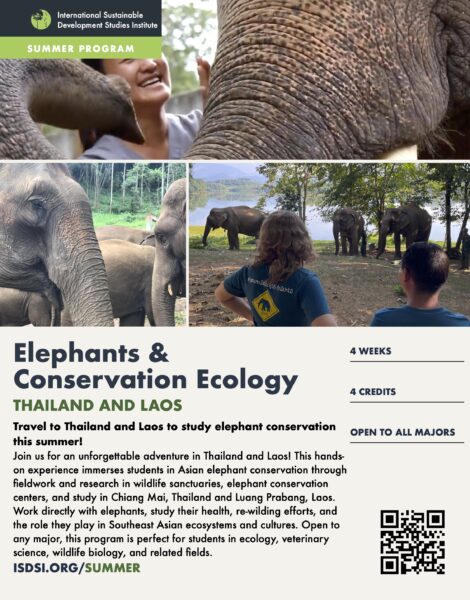Travel to Thailand and Laos to study elephants and conservation ecology!
Are you looking for a once in a lifetime experience? Hands-on and experiential, this 4 week course is a deep dive into efforts in Southeast Asia to conserve the Asian elephant, as well as their place within the Thai, Lao, and broader Southeast Asian cultural context. Students will study wild and re-introduced elephants in wildlife sanctuaries and national parks, learn first-hand best practices in elephant conservation at elephant camps and conservation centers in Thailand and Laos, and conduct independent research into elephant health, conservation, ecology, and related topics.
An important part of the course will be interacting with elephants in a variety of settings, both wild and under human care. Students need to be willing to learn to be comfortable around elephants, and how to act safely and appropriately with elephants in different settings and with a variety of different management techniques.
HIGHLIGHTS OF THE COURSE:
- Study at two UNESCO World Heritage sites: The Thung Yai-Huai Kha Kaeng Wildlife Sanctuary and the ancient Lao city of Luang Prabang
- Travel across Thailand and Laos, explore the cities of Chiang Mai and Luang Prabang, and observe elephants (and other animals) in the wild.
- Spend time interacting with elephants in a variety of settings and learn the different management techniques used with elephants in Thailand and Laos.
- Work with elephants at an elephant conservation center, an elephant hospital, study health care, birth and the care of baby elephants, and reintroduction efforts.
WILD/RE-WILDING
The course will start and end by looking at wild elephants and the efforts to re-wild elephants. In Thailand we will visit the Thung Yai-Huai Kha Kaeng Wildlife Sanctuary to study wild elephants, and how this UNESCO World Heritage site is managed. In Laos we will study the work of the Elephant Conservation Center (ECC) and how they are working to reintroduce elephants into the wild.
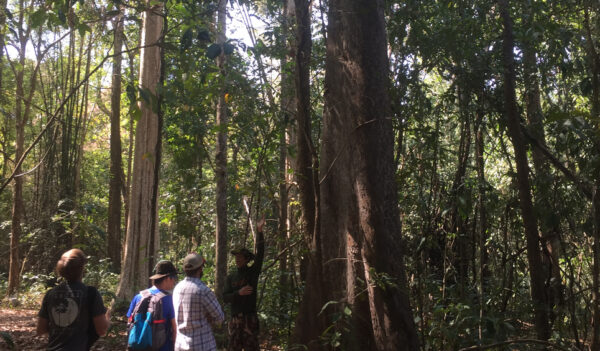
Studying wild elephant and tiger habitat in Thailand at the Thung Yai-Huai Kha Kaeng Wildlife Sanctuary.
ELEPHANT RESCUE AND CARE
An important part of the course will be visiting a variety of elephant camps and sanctuaries in Thailand and Laos to study a variety of models for managing elephants. We will be spending time learning about elephant health care, managing elephants under human care, the human-elephant relationships and the lives of mahouts, and how elephant breeding efforts play a role in the conservation of the species.
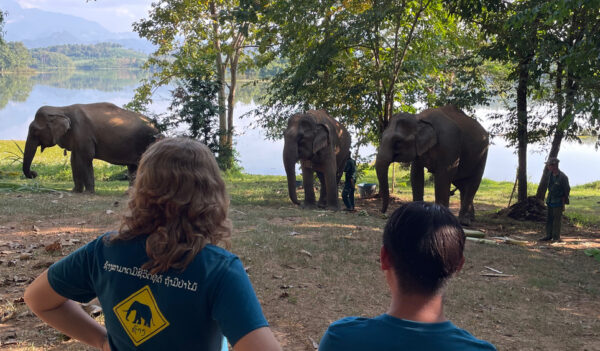
Elephants at the Elephant Conservation Center in Laos.
CULTURE AND CONTEXT
An important part of understanding and studying elephants and conservation ecology related to elephants is learning about the political, geographic, historical, and national context of elephants and their care. To this end the course will also be looking at national management plans, cultural relationships between people and elephants in Thailand and Laos, and exploring the cities of Chiang Mai and Luang Prabang to learn more about how elephants are understood by local communities as well as tourists and other stakeholders.
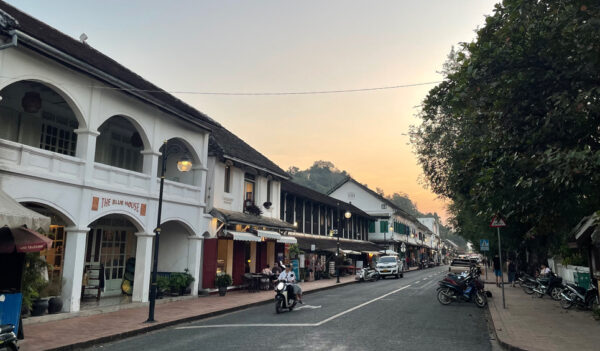
The UNESCO World Heritage city of Luang Prabang, Laos.
Course itinerary
Week 1: Wild Elephants in Thailand
The course will start in Chiang Mai, Thailand. We will meet with key stakeholders at universities and NGOs concerned about elephant conservation, and then travel to the Thung Yai-Huai Kha Kaeng Wildlife Sanctuary, a UNESCO World Heritage Site. We will study wildlife management and conservation, learn about human-elephant conflict resolution on the boundaries of the sanctuary, and observe wild elephants and other animals in the sanctuary.
Week 2: Chiang Mai and the Elephants of Northern Thailand
The second week will be spent based out of the 700 year old city of Chiang Mai, exploring the city and also meeting with veterinarians and animal science experts. A significant amount of time will be spent going to a variety of elephant camps and sanctuaries to study the variety of approaches used in elephant conservation, care, and elephant breeding programs.
Week 3: Luang Prabang and the Elephant Conservation Center of Laos
The course will then travel to Luang Prabang, Laos, and explore the UNESCO World Heritage City. We will study ecotourism, elephant camps, and the cultural place of elephants in Lao society. The course will then travel to Xayaboury province, home to 75% of the total elephant population in Laos. There we will work with the Elephant Conservation Center to study their approach to elephant rehabilitation, and the challenges and limitations with elephants formerly under human care.
Week 4: Protected Areas and the Challenges of Re-Wilding
Finally, the course will work with the ECC to study their approach to re-wilding elephants and how they have been re-introduced into the forest. The innovative re-wilding project has reintroduced two small herds of elephants into the forest, and students will learn about how they are doing data collection, tracking elephants, and related efforts. The course will then return to Chiang Mai for a final wrap up and presentation of student independent research project.
Interested in Applying?
Go to our How to Apply to ISDSI Summer Programs page.
Email us at [email protected] if you’re thinking of applying! We can help you with your application and the required materials.
